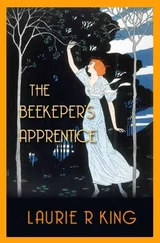J. Janes - Beekeeper
Здесь есть возможность читать онлайн «J. Janes - Beekeeper» весь текст электронной книги совершенно бесплатно (целиком полную версию без сокращений). В некоторых случаях можно слушать аудио, скачать через торрент в формате fb2 и присутствует краткое содержание. Год выпуска: 0101, Издательство: MysteriousPress.com/Open Road, Жанр: Исторический детектив, на английском языке. Описание произведения, (предисловие) а так же отзывы посетителей доступны на портале библиотеки ЛибКат.
- Название:Beekeeper
- Автор:
- Издательство:MysteriousPress.com/Open Road
- Жанр:
- Год:0101
- ISBN:нет данных
- Рейтинг книги:4 / 5. Голосов: 1
-
Избранное:Добавить в избранное
- Отзывы:
-
Ваша оценка:
- 80
- 1
- 2
- 3
- 4
- 5
Beekeeper: краткое содержание, описание и аннотация
Предлагаем к чтению аннотацию, описание, краткое содержание или предисловие (зависит от того, что написал сам автор книги «Beekeeper»). Если вы не нашли необходимую информацию о книге — напишите в комментариях, мы постараемся отыскать её.
Beekeeper — читать онлайн бесплатно полную книгу (весь текст) целиком
Ниже представлен текст книги, разбитый по страницам. Система сохранения места последней прочитанной страницы, позволяет с удобством читать онлайн бесплатно книгу «Beekeeper», без необходимости каждый раз заново искать на чём Вы остановились. Поставьте закладку, и сможете в любой момент перейти на страницу, на которой закончили чтение.
Интервал:
Закладка:
He wagged a forefinger at her. ‘That is exactly the help I want from you. Merci. ’ Hermann … where the hell was he? ‘If my partner should turn up with my car, please tell him not to hotfoot it about the city but to wait patiently. In the honey-house perhaps. He used to keep bees on his father’s farm and will find much in there to touch on memories I sadly fear he has long been too busy to recall.’
Shed fourteen, line twenty was well to the north of the Gare de l’Est through a wind-blasted Siberia of rails and a taiga of switches. Trains came and went, huffing, belching steam and coal-smoke; electric ones, too, and noise like you wouldn’t believe, thought Kohler. Donkey engines roared as track was lifted on to flatbed wagons destined for the Reich. Crates of produce were over there … People … a long double line of them. Kids held by the hand, mothers and older daughters …
Though the roundups of Jews and other so-called undesirables had largely gone on last year and Louis had documented as much as he could, there were still some who had hidden and then been caught. Gypsies, too, and Communists, Allied agents and résistants , et cetera.
Wehrmacht boys with carbines slung over their shoulders and dogs on the leash, patrolled the shuffling line, while those with the Schmeissers covered the flanks, and those who had come to supervise the deportations stood nearby.
Suitcase after suitcase was being left to one side of the tracks, but the ‘carriages’ the passengers were to take were still some distance ahead.
‘We’re there,’ said the Bzp Obergruppenführer, indicating a corrugated, rusty-roofed shed of grey concrete block that looked exactly like all the others.
‘Your name …’ began Kohler. ‘I seem to have heard of it years ago. Where’d you say you were from?’
‘I didn’t.’
‘Then tell me.’
‘Münsterberg.’
‘Near Breslau?’
Kohler was just ragging him. Of course everyone in 1924 had heard of Karl Denke, the mass murderer and butcher who had smoked and then sold the meat of his victims. ‘We weren’t related.’
‘I just wondered. Police work — you know how it is. I was in Munich; the wife at home on her father’s farm. We hadn’t yet had our two boys, Jurgen and Hans. Mein Gott , the inflation, eh? I wheeled a barrow full of marks to buy a dinner of boiled cabbage and a toothbrush!’
There’d been famine. Real hardship. From an official exchange rate of 4.2 marks to the U.S. dollar in 1918, the mark had fallen to 1,000,000 to the dollar in 1923. Those who had had work, had instantly spent their wages on anything they could get.
The smoked ‘pork’ Herr Denke had marketed had sold very well. Buttons from the bones, too, and soap from the fat and ashes.
I can’t let what’s happening to the deportees set me off, said Kohler to himself. I mustn’t.
They were climbing into cattle trucks and would freeze in them. Jésus, merde alors , how could anyone do this? He was glad Louis wasn’t here to witness it; Oona neither, nor Giselle.
‘Look, tell your miliciens to wait outside, eh? This is between the two of us. The less who know of it, the. better.’
Charonne was still very much the village it had once been. As he left the house and began to walk uphill along the cul-de-sac towards the rue Stendhal, St-Cyr knew he was being watched from more than one window. ‘A manage de convenance ,’ Madame de Bonnevies had said to Hermann and told him not to ask the neighbours. ‘Life is hard enough.’
Whispers … rumours … there would have been lots of those, for when all was said and done, the beekeeper had been an original , an odd character, an eccentric, and in any village or small town such idiosyncrasies always singled one out. Her money, too — they’d not have missed such a juicy thing.
But had she been carrying on an affair? If so, she would have done it discreetly but even then, the women of this street would have noticed and commented on a made-over skirt, a newly polished pair of prewar high heels — those silk stockings Hermann had mentioned; a chapeau cloche or beret set at a more determined angle, the hair perhaps curled.
Since the Defeat there had been a flood of anonymous letters to the authorities. Vichy and the Gestapo encouraged them, to the shame of the nation. Old scores were being settled, lies told upon lies. Even children — especially children — could be useful to those who would encourage such trash, but had there been letters of complaint about de Bonnevies?
Which of you smashed those hives and robbed them? he demanded silently. Is this why you watch me so closely?
The matter of the hives would have to be settled but for now it was the least of his difficulties. Something had caused madame to hide the fact she had known very well who Frau Schlacht was and that could only spell trouble for Hermann and himself if things turned sour.
At the intersection of the impasse , the rue Stendhal ran downhill past the graveyard and church to end in a set of stone steps. Although the day was almost half-over, the sun had failed to show itself. But here was history, he reminded himself. Architecturally there were those, he knew, who thought the Église de Saint-Germain de Charonne frightful. Only its bell tower remained of the original structure. Fires, wars, dedicated, well-meaning parishioners and determined priests had seen what had been in place since the twelfth century all but completely rebuilt in the fifteenth, gutted of its transepts in the nineteenth and left with a clock in its bell tower to give the time of funerals, confessionals, weddings and christenings, in verdigris-stained Roman numerals.
An original in itself.
Père Michel wasn’t at home in the presbytery or in the church. He was downhill from them a short distance along the rue Saint-Blaise, sitting at a corner table in the Café au Rendezvous, waiting for the Sûreté to question him.
One saw it at a glance on entering. Word had somehow been telegraphed on ahead. Mon Dieu , there were so few telephones in such quartiers, one seldom considered their use.
No, this had been done whisper by whisper and as if through the walls, but how had they known madame would be certain to send him to the priest? Oh bien sûr , it was logical. A death in the parish, the murder of one of their own, but the Sûreté could have come at any time.
They’d seen it, right from the moment he had stepped from the front entrance. They’d known it in his walk. Merde , these villages, he said, letting a rush of affection pass through him, for he was of Belleville, had been born there, and knew it and Ménilmontant and Charonne like the palm of his hand, as would this priest.
In the faltering light of a single electric bulb, shadows seemed to fill Shed fourteen. The smell was overpoweringly of buckwheat, of ripening fields, of straw and wax and beebread, cordite, blood and burning barns. The image of peasant women and children on their knees was clear. Pistol muzzles pressed to the backs of their heads. Bang, bang and into the mud and shit. The men were being hanged.
Kohler sucked in a breath and heaved a defeated sigh at the stupidity of it all, only to notice that Obergruppenführer Denke was watching him closely. The smug little bastard would report his reactions …
‘ Mein Gott ,’ he said and tried to flash a grin as he indicated the contents of the shed. ‘The Wehrmacht’s boys sure did a job, didn’t they?’
Denke probably wouldn’t know a damned thing about bees. ‘They didn’t just take the heaviest and lightest of the hives — those of the old, well-established colonies that might harbour disease, or the youngest that were too light to overwinter,’ said Kohler. ‘They took everything.’
Читать дальшеИнтервал:
Закладка:
Похожие книги на «Beekeeper»
Представляем Вашему вниманию похожие книги на «Beekeeper» списком для выбора. Мы отобрали схожую по названию и смыслу литературу в надежде предоставить читателям больше вариантов отыскать новые, интересные, ещё непрочитанные произведения.
Обсуждение, отзывы о книге «Beekeeper» и просто собственные мнения читателей. Оставьте ваши комментарии, напишите, что Вы думаете о произведении, его смысле или главных героях. Укажите что конкретно понравилось, а что нет, и почему Вы так считаете.












